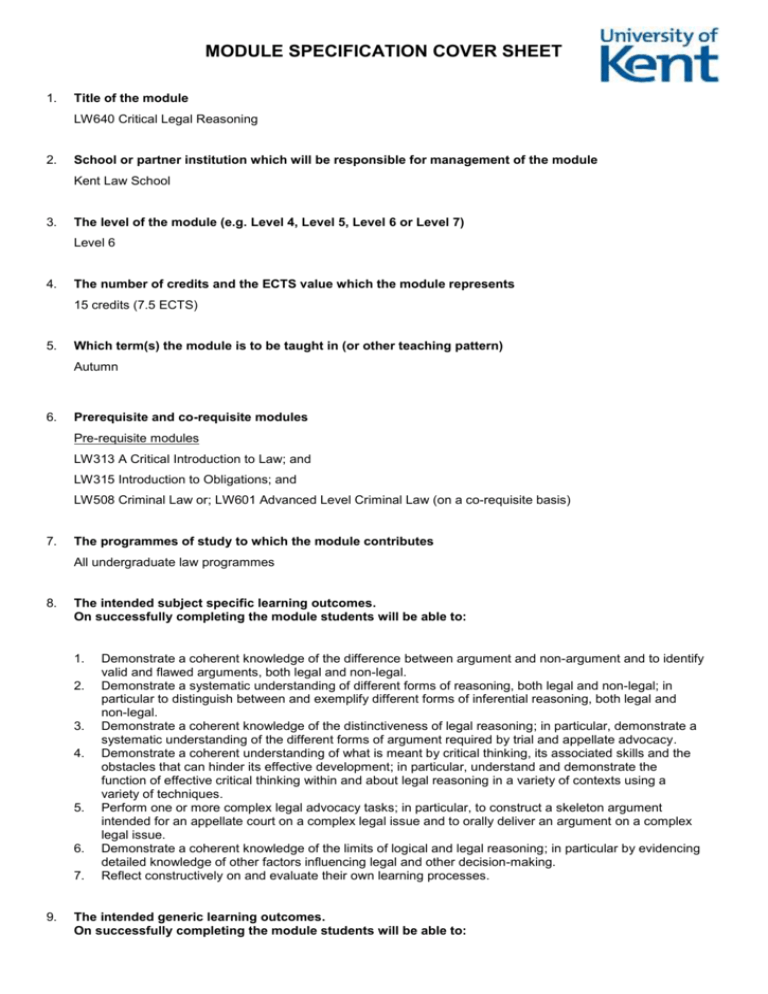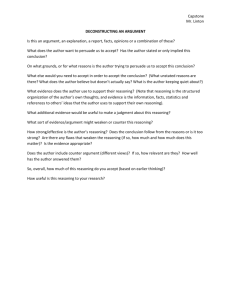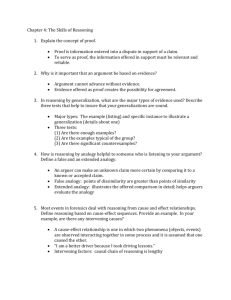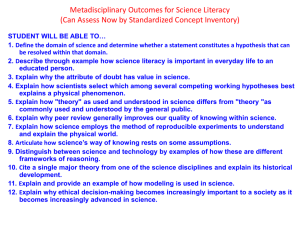module specification cover sheet module
advertisement

MODULE SPECIFICATION COVER SHEET 1. Title of the module LW640 Critical Legal Reasoning 2. School or partner institution which will be responsible for management of the module Kent Law School 3. The level of the module (e.g. Level 4, Level 5, Level 6 or Level 7) Level 6 4. The number of credits and the ECTS value which the module represents 15 credits (7.5 ECTS) 5. Which term(s) the module is to be taught in (or other teaching pattern) Autumn 6. Prerequisite and co-requisite modules Pre-requisite modules LW313 A Critical Introduction to Law; and LW315 Introduction to Obligations; and LW508 Criminal Law or; LW601 Advanced Level Criminal Law (on a co-requisite basis) 7. The programmes of study to which the module contributes All undergraduate law programmes 8. The intended subject specific learning outcomes. On successfully completing the module students will be able to: 1. 2. 3. 4. 5. 6. 7. 9. Demonstrate a coherent knowledge of the difference between argument and non-argument and to identify valid and flawed arguments, both legal and non-legal. Demonstrate a systematic understanding of different forms of reasoning, both legal and non-legal; in particular to distinguish between and exemplify different forms of inferential reasoning, both legal and non-legal. Demonstrate a coherent knowledge of the distinctiveness of legal reasoning; in particular, demonstrate a systematic understanding of the different forms of argument required by trial and appellate advocacy. Demonstrate a coherent understanding of what is meant by critical thinking, its associated skills and the obstacles that can hinder its effective development; in particular, understand and demonstrate the function of effective critical thinking within and about legal reasoning in a variety of contexts using a variety of techniques. Perform one or more complex legal advocacy tasks; in particular, to construct a skeleton argument intended for an appellate court on a complex legal issue and to orally deliver an argument on a complex legal issue. Demonstrate a coherent knowledge of the limits of logical and legal reasoning; in particular by evidencing detailed knowledge of other factors influencing legal and other decision-making. Reflect constructively on and evaluate their own learning processes. The intended generic learning outcomes. On successfully completing the module students will be able to: MODULE SPECIFICATION 1. 2. 3. 4. 5. 6. 7. Use general critical thinking skills in much wider legal and non-legal contexts. Identify and use a wider variety of argumentative techniques across a broad range of subjects. Understand the value of non-legal material in the construction of effective legal argumentation. Undertake appropriate independent legal research with minimal supervision, using a variety of legal sources and materials in order to formulate and apply legal argumentation to resolve given legal problem situations. Present legal argument both in seminars and through assessment. Retrieve up to date information, using paper and electronic sources including effective use of IT and other information retrieval systems; and systematically gather and evaluate relevant legal authority from a variety of legal sources, in particular case law, Use relevant and appropriate legal and non-legal terminology with care, accuracy and confidence. 10. A synopsis of the curriculum A central question of this module is whether, and to what extent, there is anything distinctive about legal reasoning compared to reasoning in general. That question is posed from the perspective of a legal practitioner, in particular, an advocate. The aim of the module is to equip students – as potential advocates, but also in general – with a range of tools and skills of argument that are easily transferrable across legal and non-legal contexts. It is a premise of the module that any competent advocate, or indeed lawyer, must demonstrate a proficient grounding in elementary logic. As such, the module will explore, and students will be expected to demonstrate, the role played inferential logic within legal reasoning. The module will also consider logical and other fallacies. For example, and drawing on Schauer, by asking whether authority-based reasoning (ie the doctrine of precedent) is a fallacy; and, drawing on Kahneman, by investigating the role played by psychological heuristics in all forms of decision-making including legal forms. In addition to the conventional categories of inferential reasoning, the module will consider other forms of reasoning including, but not limited to, practical, statistical, and marginal/economic forms. In the latter context, and drawing on Farnsworth, it will consider the differences between ex post and ex ante forms of reasoning: the first response being about cleaning up after things have gone wrong, and the second about the effects of decisions in the future. The latter perspective leads naturally to a broader consideration of policy-based reasoning in general. Students will explore the role played by different forms of reasoning in different contexts; for example by considering and demonstrating the use of logical deduction and probable inference in the context of legal proof (evidence) and the role of other forms of reasoning, including rhetoric, in the formulation of legal arguments. The theoretical background will provide the basis upon which students will learn to construct effective (legal) arguments and to practice the skills learned in a variety of written and oral contexts ranging from skeleton arguments, oral presentations, mock trials and/or applicationsand/or mooting (subject to availability). Students will be expected to reflect critically on their learning practice by producing a self-reflective portfolio. 11. Reading List (Indicative list, current at time of publication. Reading lists will be published annually) Cottrell, Stella, Critical Thinking Skills (2nd edn, Palgrave, 2011) Farnsworth, Ward, The Legal Analyst: A Toolkit for Thinking about the Law (University of Chicago Press, 2007) Hanson, Sharon, Learning Legal Skills and Reasoning (4th edn, Routledge, 2016) Kahneman, Daniel, Thinking, Fast and Slow (Penguin, 2011) Schauer, Frederick, Thinking Like a Lawyer: a new introduction to Legal Reasoning (Harvard, 2012) Shaw, P, Logic and its Limits (2nd edn, OUP, 1997) 12. Learning and Teaching methods 2 Module Specification Template (September 2015) MODULE SPECIFICATION The module is allocated 150 hours of study (10 hours of lectures, 10 hours of seminars and 130 hours of private study) There will be one lecture per week during the Autumn Term (excluding reading and writing weeks). Some of the lectures will be interactive. The lectures contribute to the module’s intended learning outcomes through articulation and demonstration of the knowledge base and skills outlined above in sections 8 and 9, and are of particular importance in light of the need for formal demonstration of these skills in the assessments. A one-hour seminar is provided each week (excluding reading and writing weeks). Seminars are structured with reference to Seminar Worksheets, distributed at the beginning of the term. Seminars will be designed to enhance student understanding of both the law and the issues arising from the materials. They will provide opportunity for students to undertake detailed discussion of the points raised in the seminar readings and in the lectures, and/or will make space for students to practice some of the skills learned via oral presentation or otherwise. Students will be pressed in seminars to present their thoughts clearly, justifying their positions through use of the materials and techniques studied. A number of seminars will involve students taking sides for a particular proposition in order to practice the skills of argument. The purpose of private study is to read and engage with required reading and to prepare for smaller group interactions and assessment; but most importantly to practice the various skills demonstrated as the main themes of the course. Only through practice will the skills become second nature. 13. Assessment methods. The module will be assessed by 100% coursework, consisting of a combination of: a) Two written assessments of 1500 words each (25% each) AND b) Oral presentation (25%) AND c) Self-reflective portfolio of 1500 words (25%) The first written assessment will relate to the one or more of the theoretical components of the module for example the role of cognitive biases in judicial or other decision-making or an exploration of different forms of reasoning. This written assessment will be due for submission before the skeleton argument. The rationale is that students will then incorporate some of these theoretical or practical ideas and skills into their approaches to the skeleton argument and oral presentations. The second written assessment will be a skeleton argument. The topic of the skeleton argument may (within reason) be chosen by the student or otherwise from a list compiled by the convenor. Students will take a first instance or Court of Appeal judgment and will draft a skeleton argument on the grounds of appeal or response thereto in relation to the same case. Students will be encouraged to work in opposing pairs and/or teams. For the oral component of the assessment, students will have to present the arguments set out in their skeleton arguments in more detail. Each student will have about 12-15 minutes to present their grounds of appeal or response and will be assessed accordingly. They will have had sight of their opponents’ skeleton argument in advance. They will be expected to deal with “judicial interventions”. When available, and on obtaining prior consent from the Module Convenor, students will be given the opportunity to participate in a moot on an assessed basis. Any mark awarded will replace the combined mark awarded for the skeleton argument in 13(a) and the oral presentation in 13(b), if higher, but only if the student has attained a pass mark for each of the two assessments. 14. Map of Module Learning Outcomes (sections 8 & 9) to Learning and Teaching Methods (section 12) and methods of Assessment (section 13) 3 Module Specification Template (September 2015) MODULE SPECIFICATION Module learning outcome 8.1 8.2 8.3 8.4 8.5 Learning / teaching method Hours allocated Lectures 10 X X X X Seminars 10 X X X X Private Study 130 X X X X Assessme nt method Specify word length, duration, individual or group work (as appropriate) Written assessment 1500 words X X X X X Skeleton argument 1500 words X X X X X Oral presentation Individual (12-15 minutes) X X X Selfreflective portfolio 1500 words X X Assessed moot Individual (but in team) X X X 8.7 X X X X X X X X X 8.6 X X X 9.1 9.2 9.3 X X X 9.4 9.5 9.7 X X X X X X X X X X X X X X X X X X X X X X X X X X X 9.6 X X X X X X X X X X X X X X 15. The School recognises and has embedded the expectations of current disability equality legislation, and supports students with a declared disability or special educational need in its teaching. Within this module we will make reasonable adjustments wherever necessary, including additional or substitute materials, teaching modes or assessment methods for students who have declared and discussed their learning support needs. Arrangements for students with declared disabilities will be made on an individual basis, in consultation with the University’s disability/dyslexia student support service, and specialist support will be provided where needed. 16. Campus(es) or Centre(s) where module will be delivered: Canterbury 4 Module Specification Template (September 2015) MODULE SPECIFICATION FACULTIES SUPPORT OFFICE USE ONLY Revision record – all revisions must be recorded in the grid and full details of the change retained in the appropriate committee records. Date approved Major/minor revision Start date of the delivery of revised version Section revised 5 Module Specification Template (September 2015) Impacts PLOs (Q6 & 7 cover sheet)








